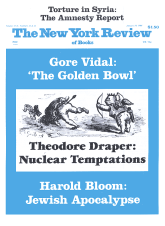In response to:
Unholy Science from the October 13, 1983 issue
To the Editors:
David Joravsky, reviewing Betrayers of the Truth, chides the authors for being overly Puritanical and insufficiently well read. Scientific research, he says, is a complex process, guided by conflicting emotions, similar to artistic creation; and he adds that many studies, some stunning autobiographies among them, have commented on this feature.
The criticism would be well taken if all scientists were aware of the emotional ingredients of their work and if science policy, educational policies included, took them into account. Unfortunately, this is not the case.
Most scientists emphasize that scientific research is free from prejudice and has objective results while elementary schools, high schools, even universities teach science as the one and only true account of the world. Religion, not science is separated from the state; the sciences, not the arts receive the bulk of the money that is spent on cultural matters; scientists, not poets are called in when complex social problems demand a solution. The fact that some scientists permit themselves the luxury of holding more realistic views counts little in comparison, especially as none of these insightful writers has ever tried to weaken the institution that pays them and makes them famous.
It needs a different breed of writers, more concerned about society as a whole and less coy in their admissions to present the matter in clear and unambiguous terms and to explore the consequences. Broad and Wade, despite their occasional slips in emphasis are such writers. They deserve better treatment than Joravsky’s brand of creative reviewing can give them.
Paul Feyerabend
Federal Institute of Technology,
Zürich, Switzerland
University of California, Berkeley
David Joravsky replies:
Sociologists of science found the Broad-Wade book sensationalist, superficial, and confused. I could not disagree, for it is sensationalist, superficial, and confused. At the same time I tried to show that the book has some redeeming qualities. I even suggested that it is worth buying, especially by scientists, so they might have on their shelves a minatory compilation of recent scandals. Beyond that, I tried to show that Broad and Wade had stumbled on some interesting features of the creative process. They angrily reject my help; they swear that nothing could be further from their minds than creativity. I accept that.
I do not accept their denial of self-policing in the scientific community. Of course they didn’t discover the frauds they wrote about in Science. They rewrote handouts from the scientists who did discover the frauds, and Science published those rewrites, and I call that self-policing by the scientific community.
Feyerabend’s mind does extend to creativity, and evidently he did get the point of my essay. I am grateful for that. I do not share his alarm about “science,” which is not a single thing but a hodgepodge of very different disciplines. The naive faith that they are a single thing, and the only way to truth, is an ideology that used to be called positivism and is now called scientism. It is not the dominant ideology of our culture. Every day’s newspaper tells me that rival nationalisms are the dominant ideology. Anyhow, I can’t see the connection with Broad and Wade’s shouting that scientists are phonies and cheats, unless one has a deep resentment of scientists and wants to knock them any way one can. Of course many scientists share the naive faith called scientism, but that doesn’t make them dangerous, only quaint or ridiculous, like those who organize their view of science by anger at that faith.
This Issue
January 19, 1984



